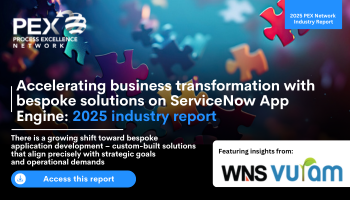Banks & insurers transform key customer-facing processes with AI agents
Research indicates a rapid transformation in how customers interact with financial services firms
Add bookmark
Banks and insurers are actively moving key customer-facing processes to artificial intelligence (AI) agents, marking a rapid transformation in how customers interact with financial services firms. That’s according to The World Cloud Report for Financial Services 2026 by the Capgemini Research Institute.
The top processes for banks to deploy cloud-native, AI agents at scale include customer service (75 percent), fraud detection (64 percent), loan processing (61 percent), and customer onboarding (59%).
Insurers display a similar pattern, with customer service also leading the way (70 percent), followed by underwriting (68 percent), claims processing (65 percent), and onboarding (59 percent).
Join the PEX Network community

Don't miss any news, updates or insider tips from PEX Network by getting them delivered to your inbox. Sign up to our newsletter and join our community of experts.
Learn MoreAI agents transform key customer-facing processes in financial services
Recent findings from the Capgemini Research Institute indicate that AI agents could generate as much as US$450 billion in economic value by 2028, underscoring a major opportunity for the financial services sector.
To seize this potential, one in three banks (33 percent) are developing AI agents internally, while nearly half (48 percent) of financial institutions are introducing new roles dedicated to supervising these systems.
As AI agents take on increasingly complex workflows autonomously, the role of cloud technology is evolving beyond infrastructure and storage. Today, 61 percent of executives view cloud-based orchestration as essential to their AI strategy.
“The combination of AI and cloud allows banks and insurers to tap the power of AI agents to better serve their customers with greater precision, speed, and impact,” said Ravi Khokhar, global head of cloud for financial services at Capgemini. “Our data reveals widespread industry optimism that the agentic era will open doors to new markets, signaling a new phase of transformation is upon us.”
Register for All Access: AI in PEX 2026!
AI adoption roadblocks persist
According to the report, banking and insurance executives identify customer onboarding and know your customer (KYC), processing loans and claims, and underwriting as the most inefficient business functions across the sector. Firms are optimistic that agentic AI can address these longstanding challenges, with real-time decision-making (96 percent), improved accuracy (91 percent), and faster turnaround times (89 percent) cited as key benefits.
However, only 10 percent of financial services firms surveyed have implemented AI agents at scale with 80 percent still in the ideation or pilot stage of deployment.
Nearly all respondents point to two critical roadblocks: a looming skills gap among business leaders and employees (92 percent) and a regulatory and compliance burden (96 percent). Most (89 percent) place compliance at the top of their organizational priorities over the next three years.
To realize the full potential of AI agents, financial institutions must take a long-term view as humans work alongside them, said Khokhar. “This means separating substance from hype. Leaders will need to consider how they can scale their agentic AI operation over time, with a vision of what they want their businesses to look like at the end of this process.”
Accelerating business transformation with bespoke solutions on ServiceNow App Engine

Today, off-the-shelf software solutions offer diverse features that enable vast opportunities to implement and maintain business transformation. However, in some circumstances, capabilities lack the flexibility and specificity required to address the unique challenges and workflows of individual organizations. As a result, there is a growing shift toward bespoke application development – custom-built solutions that align precisely with strategic goals and operational demands.
Download this report to explore how enterprises can harness the power of custom applications to drive meaningful transformation. With the growing adoption of low-code platforms like ServiceNow App Engine, organizations are building custom applications faster and with greater control. By empowering both IT professionals and citizen developers to build tailored solutions, organizations can significantly reduce time to value while maintaining control over quality and compliance.
Download Now





















